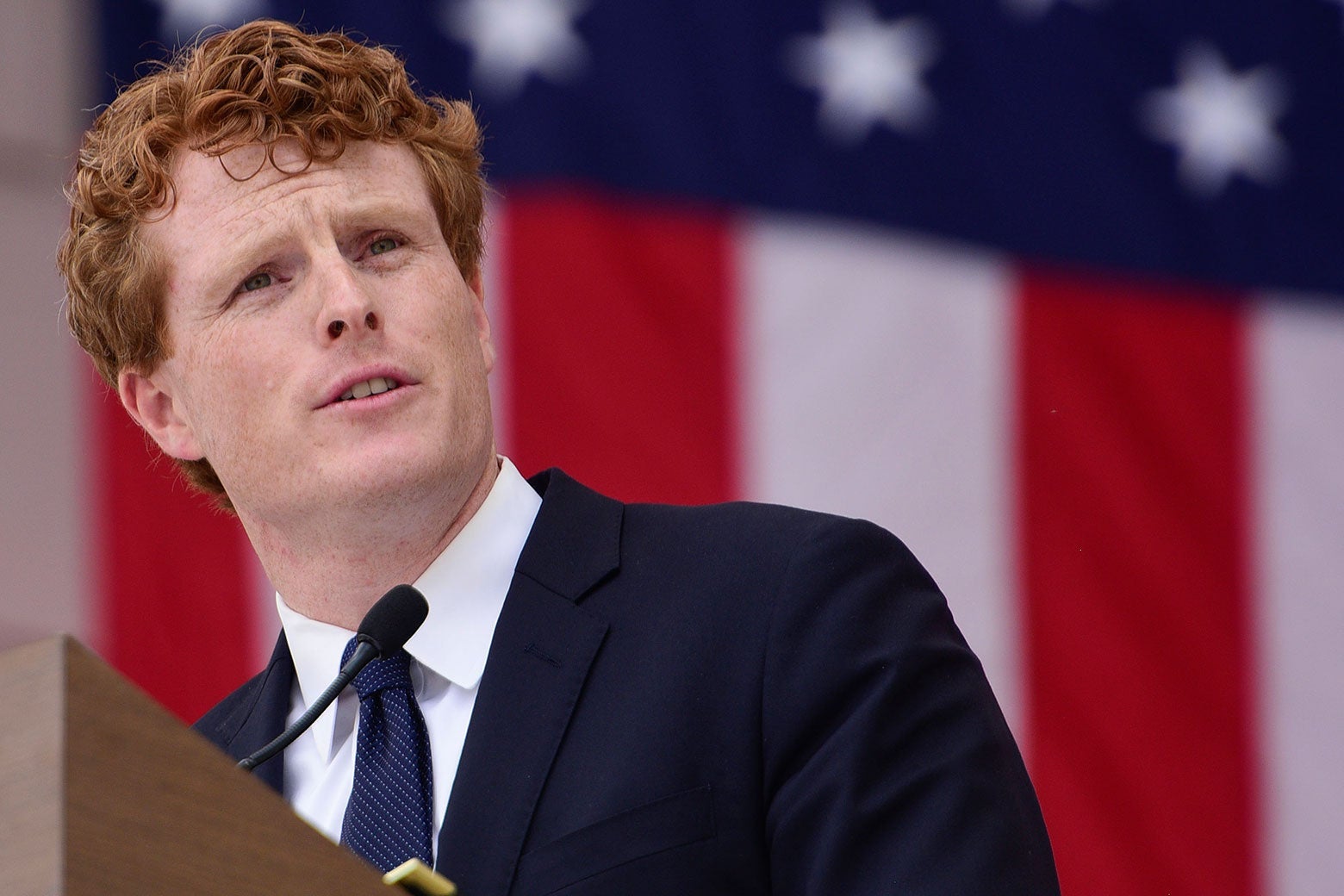In a Facebook post Monday morning, Massachusetts Rep. Joe Kennedy III acknowledged for the first time that he’s considering a primary challenge to Sen. Ed Markey. And to those who had heard of the potential candidacy—and were wondering … why?—Kennedy offered the following: “I hear the folks who say I should wait my turn, but with due respect—I’m not sure this is a moment for waiting.”
A four-term member of Congress, Kennedy spent his first couple of terms keeping his head down and focusing on committee and constituent work. The dues-paying years of camouflaging with the House’s hundreds of workaday grunts are over, though, and Kennedy is ready to be a Kennedy. He delivered the State of the Union response in 2018, is a Pelosi favorite, and has been considered a top prospect for House leadership whenever that generational changing-of-the-guard occurs at the top.
Kennedy shunned House leadership opportunities late last year, though, and now we’re seeing why. He is a Kennedy, and the House is too juvenile a permanent political destination for the Kennedys. (Well, the promising ones.) He could hold out in the hope that Elizabeth Warren wins the presidency, and then run in the special election for her Senate seat—which would be the proper “Kennedy seat” previously held by his great-uncles, John and Ted. But a primary for an open seat might get too crowded. Best to just take on old man Markey, whose behind-the-scenes political persona has lent him a strange invisibility despite having served in Congress for 43 years.
Aside from the fact that Kennedy might want to be a senator, though, what would be the point of his challenge? When he says it’s time to make a change, presumably he wants voters to agree with him. What pressing concerns are there with Ed Markey that lead Kennedy to believe he, and the party, should expend valuable resources on a Massachusetts race in a cycle where Democrats need to flip the Senate?
Kennedy’s consultants might still be sorting through the data to determine why Markey must go. In July, a “mystery poll” went out testing out various messages, one of the first signs that something was afoot. “Kennedy’s campaign declined when asked whether they conducted the July mystery poll,” Politico reports, “which pitched positive and negative campaign messaging for Kennedy and Markey, including on issues like marijuana, ‘Medicare for All’ and the ‘Green New Deal.’ ”
And those issues point out the problem, ideologically, with the idea of challenging Markey: Markey is a “Medicare for All” supporter and a Green New Deal, uh, lead author. On marijuana, Markey is wishy-washy, but that’s not an issue on which Kennedy would want to pick a primary fight. Markey is a reliably liberal vote, and Kennedy can’t make a credible case to be to his left. If he doesn’t want to seem redundant, he’d have to package himself as coming from Markey’s right, and an image-conscious Joe Kennedy probably wouldn’t want “centrist challenger” appended to his exciting brand.
So maybe there’s not much ideological justification to a primary challenge. But there wasn’t much of a difference in policy between ex-Rep. Michael Capuano and now-Rep. Ayanna Pressley last year’s Democratic primary in the state’s 7th District, either: Both were strong progressives. Pressley and her supporters were able to make the argument, however, that a district that was only 34 percent white could send someone more representative of its constituents to Congress.
Unfortunately, Kennedy and Markey are both very much white Irish Catholic men. The only real demographic difference between them is that Markey is a 73-year-old white Irish Catholic man, whereas Kennedy is a 38-year-old Irish Catholic man. If Kennedy does run, then, vague (but soaring!) rhetoric about generational change and “energy” would have to be his message.
If the two were completely interchangeable, the primary would be pointless. But one aspect of Markey’s record means that elevating Kennedy over him in the next Congress would be a clear downgrade. While it’s true that Markey was trying to glom onto some of Rep. Alexandria Ocasio-Cortez’s stardom by introducing the Green New Deal alongside her earlier this year, his interest in climate policy wasn’t a recent invention. His focus on the environment goes back decades, highlighted by the successful House passage of the 2009 Waxman-Markey cap-and-trade bill that he co-sponsored as chair of the House select climate change committee.
If Democrats are able to take the presidency and the Senate in 2020, passing climate change legislation will be one of the top, if not the top, priorities the unified Democratic government would have. Markey, as an orator, may not give crowds goosebumps. But he’d be a good guy to keep around for make-or-break climate legislation.
So, Kennedy is not an ideological contrast with the incumbent. He wouldn’t bring any diversity to the Senate. He would tempt the party to spend valuable resources defending an incumbent when its priority is to take the majority back from Sen. Mitch McConnell. And his challenge aims to remove a top insider climate change policy guy from Congress precisely when a top insider climate change policy guy would be of use. When Kennedy says that he’s “not sure this is a moment for waiting,” well, it’s incredible how specifically designed this moment is for him to wait.
